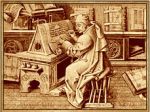Rare Books from St.-Petersburg Publishing House

The company publishes hand-made books in editions of 2-25 copies. All books are printed manually on a 19th century printing press, or hand-written on hand-made paper.
Unique samples of books of the highest artistic level are carefully kept in the largest libraries and museums such as the State Hermitage (St. Petersburg), the Russian National Library, the Bavarian National Library, the New York Public Library, the Cabinet of Engravings in Berlin, the Victoria and Albert Museum in London, the National Museum of Britain, and in the most famous private book collections.
Books are decorated with illustrations by famous artists from St. Petersburg in original printing techniques: lithography, etching, woodprint, monotyping, and copperplate print. Bindings are made from calfskin, silk, metal, wood, ceramics, and marble by expert book restorers.
The Ten Commandments, published by Rare Books from St. Petersburg, became one of the company’s masterpieces. The book’s pages are made of dark Egyptian papyrus. 'Matzo' is made of special paper. By the way, the paper for the Ten Commandments was manufactured by the publishing house. Artist Andrey Lourier, who learnt paper manufacturing in Finland, took the last of the French paper, added some sawdust, ground it, strained the liquid mass through a sieve and dried on glass in his workroom.
The text was printed manually on a 19th century printing press, in Hebrew, in Prague aggadah script. It is has parallel translations in seven languages: Ancient Greek, Church Slavonic, Arabic, Persian, Sanskrit, Chinese and Japanese. Texts of translations were printed by hand on parchment manufactured in Israel. On the calfskin cover there is a 'matzo' moulded and struck from patination silver. It is encrusted with tablets made of stone of the Moses Mountain in the Sinai desert. They were delivered by a special expedition and processed by the jewelry-lapidary. The hinge that holds the pages of the book is made of silver.
Another masterpiece is the book 'The Trojan War'. It tells the history of the war in quotations of work of ancient authors: Thucydides, Apollodorus of Athens, Homer, Pausanias, Philostratus, Diador of Sicily, Paulus Orosius, Pompeius Trogus, Diksis of Crete, Virgil, and Titus Livius. The book contains 26 wood engravings. The text is printed on a 19th century press on a French hand-made paper. The binding is made of leather with elements of gilding, insertions of original wooden boards after which engravings for the book were printed. It is published in an edition of 25, numbered and signed by the artist and publisher. One of them is kept in the Hermitage (St. Petersburg).
Materials used for rare book production are always unique. If it is leather it is delivered from France. Nowadays they order it in Moscow in the right size, colour, and texture. But paper, paint, and other materials are brought from overseas. Hand-made paper is bought from firms that have been producing it for centuries, using techniques from the XV-XVII centuries. They use pure cotton, only for a light tincture there can be added a certain colour. Then masters cut the paper and process it with a special hammer to make the edges rough.
Sometimes the idea of decoration demands some irregular solutions; calligraphers have to rewrite a book from the very beginning by hand. If they make a mistake they rewrite the book again using the same expensive paper! “If we settled down the work the price of which is life and eternity, we should spare neither materials nor time,” – said Pyotr Suspitsyn. The rewriting of 'Don Quixote' of Miguel de Cervantes Saavedra took longest of all. Fifteen copies were produced; five in English, five in Spanish, and five in Russian.
“To my mind a book is like a chamber orchestra where a team of consummate musicians give the world real treasures of their art. Music of a book… With bated breath we enjoy the work of a printer. Using the great powers of his intuition he puts the energy of his hands into the printed words which seem to come alive on a pure sheet of paper. Binders make a book real, tangible. Like architects they sculpt its façade. But the main role belongs to an artist. Everyone follows his conception and point of view.”
Back to listCalligraphy is a kind of music not for the ears, but for the eyes.
(V. Lazursky)



